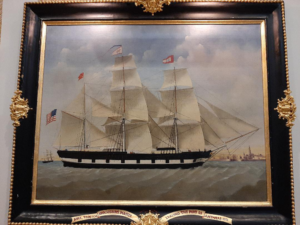Tedesco – The Sinking of a Ship, The Birth of a Club


Tedesco Country Country Club
[Author’s Note: In a first for Golf Course Trades, we are publishing a two-part piece on Marblehead, Massachusetts’ Tedesco Country Club, a course designed and redesigned by many hands, including Wayne Stiles, Jon Van Kleek, and Donald Ross, and most recently renovated by Ron Forse. The course is named after one of the most famous shipwrecks in New England, the cargo bark Tedesco, which sank in a blizzard offshore over 160 years ago. To stretch my legs as a bit as a writer, the magazine encouraged me to write a short piece of historical fiction about the sinking of the ship and the naming of the club – something completely different from bunkers and drainage, soils and supers. Next month, we’ll meet Peter Hasak the super, Ron Forse the renovation architect, and explore the course in-depth. But for this month, sit back and allow us at GCT to spin you a yarn of wooden ships on the water, a fictional account of the sinking of the Tedesco, along with the true story of the naming of the club…]
—Off the coast of Swampscott, Massachusetts January 18, 1857—
Salty Old Joe was holding court in the mess again, spinning his yarns to little Jeffrey the blond-haired cabin boy, Jensen the cook, Warren the carpenter, and any other hand foolish enough to sit within earshot. A half-toothless mouth gnawed on salt pork and hard bread in between his lurid jeremiads, and when he grinned, food remnants peppered his gums. It only added to his intended effect.
“It’s a red sun in the mornin’, sailor take warnin’! Red sun at night, sailor’s delight, but they never said anything about the ghost ship, did they?” Joe growled.
At that, the cabin boy’s eyes grew wide as pie plates, and he hugged Revere, the young Gloucester crewman next to him with a squeal of terror and delight. Old Joe pressed his advantage.
“It came out of nowhere…in a storm just like this one,” he intoned breathlessly, as though casting an incantation. “Out of nowhere, I say! A great black cloud of smoke and oakum shrouds her, she stinks of sulfur and gunpowder, a ghostly captain with no face steers her helm, and with all the cannon fire of Hell, she’ll shatter our masts, burn our sails, and send us all down to meet Ol’ Nick!”
He gave a great snarl – “YEAAAARRRRRRGGGGHHHHH!” spitting crumbs all over the table – and started tickling little Jeffrey, who exploded in shrieks and giggles.
“Oh, you’re full of piss and wind, Joe,” laughed Dodge, another of the young hands, a Portlandian, strong and strapping. He took a long pull on his grog, black Caribbean rum diluted with water and spiced with real citrus. The ship’s Captain had received a great treasure from the Widow Winship. the mother of the cabin boy. It was a small keg of pure lemon juice, worth its weight in diamonds for its beneficial effects in staving off scurvy. The widow’s late husband, a ship’s doctor and the Captain’s friend was killed four years earlier when a storm wrecked the cargo ship Forest Queen onto Cliff Beach in Scituate. The Captain considered it his duty to care for the boy by taking him to sea, as the father would have wanted. And the grateful widow’s lemon juice, useless to her, was regarded by the crew as the nearest thing to a holy relic.
But beneath the joviality in the mess, concern simmered inside Dodge. He was recently married to Molly Andrews, daughter of the Reverend Andrews of St. George’s Church. Molly had three sisters, Sissy, Lily, and Sarah, and when Dodge was with them, he was horribly outnumbered four-to-one. This was his first trip since marrying the brown-haired lass with the almond-shaped green eyes, and he wanted to impress her family by coming home with splendid booty. A successful round trip – from New England to Spain and Portugal delivering dried cod called “baccalau” to Europe and bringing back wine, raisins, salt, olives, and sherry to America – would provide him a handsome share. Dodge could buy Molly some “pritty jools” as he put it, “pritty jools indeed!”
Indeed all the hands were eager to be home after so long at sea. Life on board a cargo sailing ship was chaos – beloved, maddening, addictive chaos. Living exclusively in the moment, the whole world was reduced to a tiny wooden box tossed about on the endless waves. Life was reduced to the next wave, the next swell, the next change of the breeze, and a few shrewd views of the night sky through the Captain’s sextant.
It was a happy life, happier still with the wind in the sails and following seas. Captain Peterson was taut, but not a tyrant, and the first mate, sailing master, and bosun all respected the hands and treated them well. They had coffee, toast, salt pork, fish, salt beef, molasses, beans, bread, and of course rum.
“I’d rather have them six sheets to the wind on occasion than unhappy,” the Captain believed. So he’d give the men an extra ration of grog every time they performed their duties with a little extra zeal. They had behaved quite well during the dangerous squalls off the coast of Portugal and again passing the Azores. Now the 396 tonnes, 121-foot long cargo bark named for famous Spanish opera singer Fortunata Tedesco was nearing home and hearth. Smythe, a Marblehead man, could buy medicine for his sick mother and visit her every day. Warren would be reunited with his wife and four-year-old son. And Hawthorne yearned for news of his twin brother, who was manning the whaler Nantucket as it cruised in frigid waters. [Author’s Note: The Nantucket was wrecked by a whale in 1859 off the shores of Nashawena Island, killing several onboard, including Hawthorne’s brother.]
But this blizzard that had materialized out of nowhere was far worse than anything they’d seen during the crossing from Cadiz, from which the Tedesco had left laden with her cargo. So close to home, and now this; even that dirty weather they navigated off the coast of the Azores was nothing compared to a New England Nor’easter.
“Don’t listen to Old Joe,” Revere added, lifting a still giggling Jeffrey off the bench and onto the deck and lightening the mood. “He’s been stealing the key to the spirit room again.” The table fell apart laughing once again.
Old Joe swilled his grog greedily, wiped his mouth on his torn sleeve, and with his jowls still dripping, returned to his stagecraft.
“Oh no, I know what I’m on about! Waters not far from here…in a storm just like this…”
The sound of pipes interrupted him, and when the sailing master’s voice boomed “All hands about the ship!” they sprang to their feet, galloped up the steps, and ran to their stations. Revere, a direct descendant, father-to-son of Paul Revere and whose coat of arms depicts a lantern in a lighthouse, beams of light streaming from it raced to take up his spot in the crow’s nest of the mainmast, keeping watch like his ancestor before him. Dodge sped forward to the jib, one of only two sails the ship was wearing as the wind had grown in ferocity since he went below decks for mess. Van der Meer, the crew’s lone Dutchman and a man whose grandfather had survived the British navy’s attack and seizure of the merchant ship Furie by the H.M.S. Sirius in 1798, manned the forestaysail. Warren and Hawthorne took their places at the mainmast and mizzen.
It had been a glorious day, but as the sunset, black clouds had begun to roil, obscuring the night sky. The swell was increasing as was the wind. When the wind blows and the clouds gather in the forties latitudes, a storm could intensify with extraordinary speed, and a seemingly sweet day could turn into boiling darkness in mere minutes, as this one did, full of racing water and mountainous waves.
In the cabin, the barometer glass had sunk frighteningly low, and the green water swelled to a white curl. The howl in the rigging grew higher and louder by far, a banshee shriek. A grey-black haze descended like a curtain, then a whirlwind of white snow.
“The Ghost Ships a-comin’” Old Joe warned van der Meer. “You better hold fast.”
Van der Meer didn’t argue, his eyes as wide as little Jeffrey’s a few moments earlier.
On the quarterdeck, Captain Herman Peterson was grim, but resolute. His sextant was useless with no stars in the night sky to navigate by and the whole world a whirling white of snow – the visibility of the inside of a milk bottle. But he had seen a lone white light twinkling in the distance, and the lookouts had confirmed it. “Boston Harbor” he thought, and the ship made for the light as though it were an angel beckoning them.
And that was their ultimate undoing. In the blizzard, they had missed Boston Harbor. The white light they saw in the distance wasn’t Boston, it was Ed Rock Lighthouse and Little’s Point, and a labyrinth of razor-sharp rocks lay between them and port. Tossed inexorably shoreward by both the unremitting waves and unyielding winds, the ship was sailing straight into the rocky maze.
Years later, the Ed Rock light was beamed in red, not white, so as to assuage any confusion. But with an almighty gale sweeping over a mile of sea, the lone light in the storm was a will-of-the-wisp luring the sailors on the rocks. No siren’s call was ever so deadly.
The cargo bark Tedesco suddenly looked alone and forlorn, the boundless ocean and the merciless blizzard gathering their full strength, the ship a helpless plaything in the iron grip.
Over the tempest, the men heard the voice of Higgins the sailing master. “Jib and forestaysail! Give her half a point!” But beneath the steely courage in his voice, an icy fear froze his veins. They were dangerously undermanned, a mere crew of 12 to steer and rig a three-masted ship that required a full complement of 20 men divided into two watches to handle her dual rigging, both square and fore-and-aft. The men were already exhausted from sailing short-handed, and with the maelstrom howling violently, the likelihood of being dismasted was rising. If a mast fell, the ship would broach to and be dragged under the mountainous waves, the instant death of everyone on board.
Revere, sharp-eyed as his ancestor, was the first to see the rocks through the snow, but wind and tide were too strong.
“Rocks!” he cried. “Dead ahead!” A response came back immediately.
“All hands about the ship! Hoist the _____ and lower the _________,” shouted Higgins, but his voice was drowned out, and his men couldn’t make out the orders. Confusion reigned for a moment, and then there was an enormous shuddering crash that boomed and echoed, followed quickly by a rending of timbers. The ship had struck the Rock. The whole ship gave a tremendous lurch leeward, and men were thrown from their feet into the air. Wooden shrapnel and nails flew everywhere. One particularly large shard struck Warren in the head, knocking him to the deck.
A moment later there was a loud cracking sound and the mainmast lurched sideways. The stays broke away, ropes flew, and then mast, sail, and crow’s nest with Revere still in it were carried right away over the side and into the sea.
“Man overboard!” cried Jacabs, the first mate, but there was no time to respond. Green water and blood blinded the Captain, who struggled to get to his knees. The rigging was pulling the front of the ship under the water, turning the Tedesco almost completely on her broadside, on her beam ends, broached to.
Another mountainous wave swept over her with a white curl. There was a blur of sail, a tumult of rigging, flying spars, and then a shattering of timbers as the waves smashed the ship into the rock, again and again, dragging men and what was left of the vessel under a behemoth wave of green foam.
The next morning dawned cold and clear. To their astonishment, the fisherman who had left their boats a little below the high water mark returned to find nothing but shards and shrapnel, flotsam and jetsam. Bodies of the crew had washed up on Whale Beach, and broken wreckage lay all along the coast.
The bright sunshine and profound silence, punctuated only by the soothing roll of the waves, was a horrible sort of irony.
—Swampscott, Massachusetts, 1899 The summer home of Mr. H. O. Houghton, Jr.—
The three were in splendid agreement. The two ladies from Cambridge and their gentleman friend would commission a few holes of golf along the Swampscott shore, 65 acres between Little’s Point and Puran Road. 15 local residents had pledged the princely sum of $500.00 apiece, and construction would soon begin on a clubhouse, a bathhouse for beachgoers, and a shed for the members’ horses.
“What shall we call it?” asked Mrs. Arthur Little.
Henry Oscar Houghton, Jr. scratched his aquiline nose. He looked around the drawing-room. On one wall hung a portrait of his father, the founder of Houghton-Mifflin Publishing, and later, the Mayor of Cambridge. Across the room, the wall was dominated by an enormous map of eastern Massachusetts. On another wall hung an oil painting of a three-masted ship floating on the waves, its sails full and billowing.
“Tedesco,” Houghton said, nodding. “We’ll name it after the ship that wrecked upon Long Rock.”
“Tedesco Rock,” corrected Mrs. Little.
“Tedesco Rock,” repeated Houghton, ignoring the minor social faux pas. Correcting a gentleman was a lady’s privilege. “In memory of those who lost their lives,” he concluded.
The ladies agreed, it was a glowing tribute and a worthy foundation upon which to build the club. It was done and handsomely done at that.
[The author wishes to thank the following individuals for their invaluable contributions: Swampscott Historian Lou Gallo, William Fowler, former professor of American and Maritime History at Northeastern University, and Bob Green, Head Professional, Tedesco Country Club. Today a Tomb of Unknown Sailors at the Swampscott Cemetary marks the graves of the crew. What is believed to be one of two Tedesco anchors stands near Fisherman’s beach. The anchor is a memorial to Swampscott mariners who lost their lives at sea and is in the park above Fisherman’s Beach near the boulder dedicated to Marine Corps Lieutenant General John C. Chaisson.]
When not reporting live from major sports championships or researching golf courses for design, value, and excitement, multiple award-winning sportswriter Jay Flemma is an entertainment, Internet, trademark, and banking lawyer from New York. His clients have been nominated for Grammy and Emmy awards, won a Sundance Film Festival Best Director award, performed on stage and screen, and designed pop art for museums and collectors. Twitter @JayGolfUSA
Recent Posts
Memphis Country Club: A Golfer’s Study in Precision and Tradition
If you have ever teed it up at Memphis Country Club, you know this isn’t…
Foley Company attains GCSAA Silver Partner Status
Foley Company, a leader in turf equipment innovation and technology, affirms its support of the…
Harrell’s continues longstanding support of the GCSAA Foundation
Harrell’s LLC, a leading distributor of customized agronomic products for turfgrass since 1941, has donated…
City of Orlando Announces New State-of-the-Art Driving Range at Dubsdread Golf Course
The City of Orlando is excited to announce the construction of a brand-new, state-of-the-art driving…
Discover Puerto Rico for Great Golf Trips and After-Round Activities, Amenities
Golfers cannot live by the game alone which is why Puerto Rico provides the perfect…
Q&A with a Multi-talented Golf Course Architect – Part 2: Making the Rounds – Installment 39
This column features recollections of the author’s 37 years as a golf writer. These installments…



